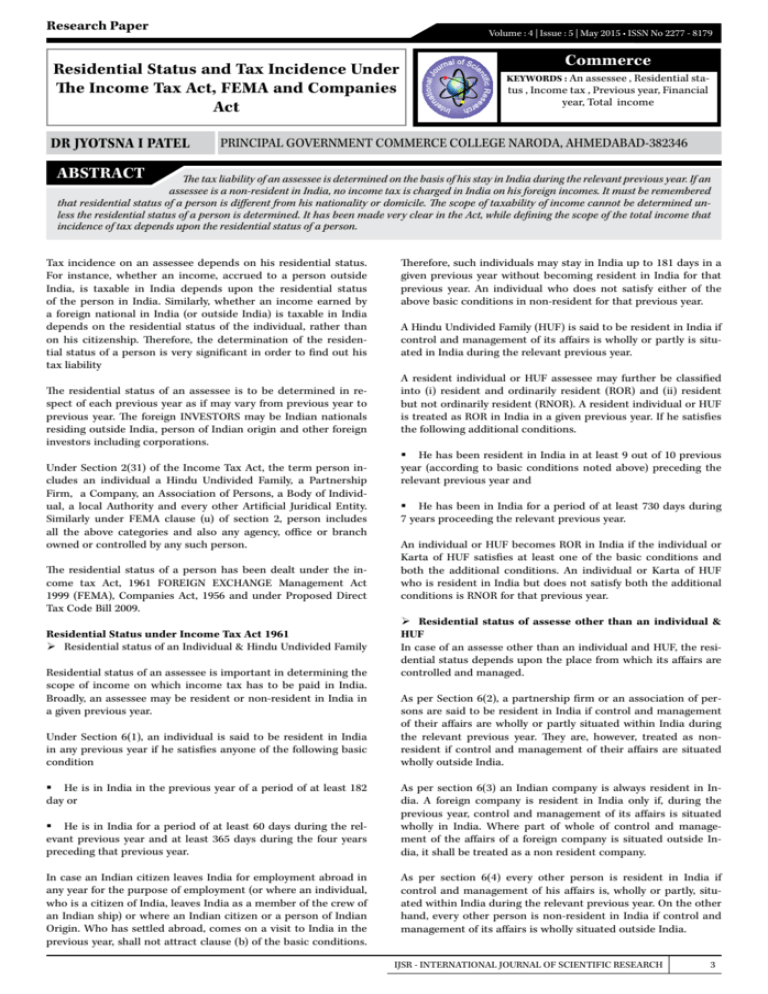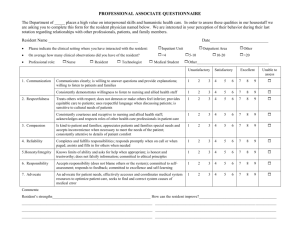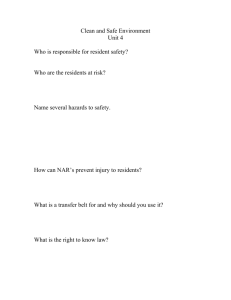Residential Status and Tax Incidence under the Income Tax Act
advertisement

Research Paper Volume : 4 | Issue : 5 | May 2015 • ISSN No 2277 - 8179 Residential Status and Tax Incidence Under The Income Tax Act, FEMA and Companies Act DR JYOTSNA I PATEL Commerce KEYWORDS : An assessee , Residential sta- tus , Income tax , Previous year, Financial year, Total income PRINCIPAL GOVERNMENT COMMERCE COLLEGE NARODA, AHMEDABAD-382346 ABSTRACT The tax liability of an assessee is determined on the basis of his stay in India during the relevant previous year. If an assessee is a non-resident in India, no income tax is charged in India on his foreign incomes. It must be remembered that residential status of a person is different from his nationality or domicile. The scope of taxability of income cannot be determined unless the residential status of a person is determined. It has been made very clear in the Act, while defining the scope of the total income that incidence of tax depends upon the residential status of a person. Tax incidence on an assessee depends on his residential status. For instance, whether an income, accrued to a person outside India, is taxable in India depends upon the residential status of the person in India. Similarly, whether an income earned by a foreign national in India (or outside India) is taxable in India depends on the residential status of the individual, rather than on his citizenship. Therefore, the determination of the residential status of a person is very significant in order to find out his tax liability The residential status of an assessee is to be determined in respect of each previous year as if may vary from previous year to previous year. The foreign INVESTORS may be Indian nationals residing outside India, person of Indian origin and other foreign investors including corporations. Under Section 2(31) of the Income Tax Act, the term person includes an individual a Hindu Undivided Family, a Partnership Firm, a Company, an Association of Persons, a Body of Individual, a local Authority and every other Artificial Juridical Entity. Similarly under FEMA clause (u) of section 2, person includes all the above categories and also any agency, office or branch owned or controlled by any such person. The residential status of a person has been dealt under the income tax Act, 1961 FOREIGN EXCHANGE Management Act 1999 (FEMA), Companies Act, 1956 and under Proposed Direct Tax Code Bill 2009. Residential Status under Income Tax Act 1961 Residential status of an Individual & Hindu Undivided Family Residential status of an assessee is important in determining the scope of income on which income tax has to be paid in India. Broadly, an assessee may be resident or non-resident in India in a given previous year. Under Section 6(1), an individual is said to be resident in India in any previous year if he satisfies anyone of the following basic condition He is in India in the previous year of a period of at least 182 day or He is in India for a period of at least 60 days during the relevant previous year and at least 365 days during the four years preceding that previous year. In case an Indian citizen leaves India for employment abroad in any year for the purpose of employment (or where an individual, who is a citizen of India, leaves India as a member of the crew of an Indian ship) or where an Indian citizen or a person of Indian Origin. Who has settled abroad, comes on a visit to India in the previous year, shall not attract clause (b) of the basic conditions. Therefore, such individuals may stay in India up to 181 days in a given previous year without becoming resident in India for that previous year. An individual who does not satisfy either of the above basic conditions in non-resident for that previous year. A Hindu Undivided Family (HUF) is said to be resident in India if control and management of its affairs is wholly or partly is situated in India during the relevant previous year. A resident individual or HUF assessee may further be classified into (i) resident and ordinarily resident (ROR) and (ii) resident but not ordinarily resident (RNOR). A resident individual or HUF is treated as ROR in India in a given previous year. If he satisfies the following additional conditions. He has been resident in India in at least 9 out of 10 previous year (according to basic conditions noted above) preceding the relevant previous year and He has been in India for a period of at least 730 days during 7 years proceeding the relevant previous year. An individual or HUF becomes ROR in India if the individual or Karta of HUF satisfies at least one of the basic conditions and both the additional conditions. An individual or Karta of HUF who is resident in India but does not satisfy both the additional conditions is RNOR for that previous year. Residential status of assesse other than an individual & HUF In case of an assesse other than an individual and HUF, the residential status depends upon the place from which its affairs are controlled and managed. As per Section 6(2), a partnership firm or an association of persons are said to be resident in India if control and management of their affairs are wholly or partly situated within India during the relevant previous year. They are, however, treated as nonresident if control and management of their affairs are situated wholly outside India. As per section 6(3) an Indian company is always resident in India. A foreign company is resident in India only if, during the previous year, control and management of its affairs is situated wholly in India. Where part of whole of control and management of the affairs of a foreign company is situated outside India, it shall be treated as a non resident company. As per section 6(4) every other person is resident in India if control and management of his affairs is, wholly or partly, situated within India during the relevant previous year. On the other hand, every other person is non-resident in India if control and management of its affairs is wholly situated outside India. IJSR - INTERNATIONAL JOURNAL OF SCIENTIFIC RESEARCH 3 Volume : 4 | Issue : 5 | May 2015 • ISSN No 2277 - 8179 Residential Status under FEMA Under FEMA the residential status of an individual is determined by the purpose for which goes abroad. Section 2 (v) provides that a person residing in India for more than 182 days during the course of the preceding financial year is a person resident in India. Further, if says that in case any other purpose in such circumstances as would indicate his intention to stay in India for an uncertain period will be regarded as resident in India for such financial year. Similarly if any person goes out of India stays outside. India for fulfilling or achieving any of the aforesaid purposes as would indicate his intention to stay outside India for an uncertain period will be regarded as non-resident in India. Further, it provides that any person or body corporate reiterated in Indian and an office, branch or agency in India owned or controlled by a person resident outside India or by a person resident in India will also be regarded as person resident in India. An Indian citizen who stays abroad for employment or for carrying business or vocation outside India or stays abroad under circumstances indicating an intention for an uncertain duration of stay is a non resident (person posted in U.N. organizations and official deputed abroad by Central / State Government and public sector. Undertakings on temporary assignments are also treated as non-resident) Non-resident foreign citizens of Indian origin are treated on par with non-resident Indian citizens. Residential status under Companies Act, 1961 Schedule XIII of the companies Act, 1961 deals with conditions to be satisfied the appointment of a managing or whole time director or a manager (referred to as managerial person) of the Company without the approval of the Central Government. Explanation to Clause (e) or Part I of the Schedule provides that resident in India includes a person who was been staying in India for a continuous period of not less than twelve immediately preceding the date of his appointment as a managerial person and who has come to stay in India for taking up employment in India or for carrying on a business or vocation in India. Comparison of residential status under Income Tax Act, FEMA & Companies Act Since the criteria for determining an individual’s residential status differ under FEME and Income Tax Act, it is possible that an individual can be regarded as a resident under the Income Tax Act and a non-resident under FEMA and vice versa. Under the Income Tax Act, an individual’s residential status is determined for a particular year and is relevant to determine the taxability of income earned that year. Under FEMA, the residential status is not only to be determined for a particular point of time, it is an ongoing process and is relevant for determining whether an individual can undertake a particular transaction at that particular point of time. A person who qualifies to be a non-resident under the Income Tax Act, 1961 will also be considered a non-resident for the purposes of application of FEMA, but a person who is considered to be non-resident under FEMA may not necessarily be a nonresident under Income Tax ACT. For instance a resident Indian goes abroad to conduct business in December 2008. Under the Income tax Act, he will be a regarded as resident during financial year 2008-09 as period of stay in India is more than 182 days. However, under FEMA, he will be regarded as non-resident the moment he leaves the country for business purposes. Under the Companies Act, 1956 a resident in India includes a person who has been staying in India for a continuous period of not less than twelve month immediately preceding the date of his appointment as a managerial person. Therefore, a person 4 IJSR - INTERNATIONAL JOURNAL OF SCIENTIFIC RESEARCH Research Paper who has come to stay in India for taking up employment or for carrying on a business or vocation may not be eligible to be appointed as a managerial person of a company, without approval of the Central Government, till the time he has stayed in India for a continuous period of twelve months even though he will be a treated as resident under FEMA the day arrives in India for taking up employment or for carrying on business or vocation as would indicate his intension to stay for an uncertain period and under Income Tax Act upon his stay in India for at least 182 days in the previous year. Incidence of Tax As per Section 5 of the Income Tax Act, 1961 incidence of tax on a taxpayer depends on his residential status and also on the place and time of accrual or receipt of income. In order to understand the relationship between residential status and tax liability, one must understand the meaning of “Indian Income” and “Foreign Income”. An Indian Income is one which satisfies any of the following conditions: 1) If income is received (or deemed to be received) in India during previous year and at the same time it accrues ( or arises or is deemed to accrue or arise) in India during the previous year, OR 2) If income is received (or deemed to be received) in India during previous year but it accrues (or arises) outside India during the previous year, OR 3) If Income is received outside India during the previous year but it accrues (or arises or is deemed to accrue or arise) in India during the previous year. Similarly, Foreign Income is one which satisfies both the following conditions: 1) Income is not received (or not deemed to be received) in India , and 2) Income does not accrue or arise (or does not deemed to accrue or arise) in India Indian income of an individual and HUF from a business controlled or profession setup in India will be taxable in the hands of resident and ordinarily resident and resident but not ordinarily resident but not in the hands of a non-resident. However , Foreign income from a business controlled or profession setup outside India will be taxable only in the hands of resident and ordinarily resident and not in the hands of a resident but not ordinarily or a non-resident person. Foreign income of any other taxpayer (Company, Firm, AOP, BOI etc.) will be taxable if the taxpayer is resident in India and will not be taxable in case the taxpayer is non-resident in India. Residential status under the proposed Direct Tax Code Bill, 2009 The proposed Direct Tax Code Bill, 2009(referred to as “the code”) is a comprehensive legislation that consolidates the entire law relating to direct taxes (income tax, dividend distribution tax, fringe benefit tax and wealth tax) in India and aims to simplify the existing laws which have for long been considered as complex by the practitioners of the laws. As per the Code, an individual shall be resident in India an any financial year, if he is in India (a) for a period or periods amounting in all to 182 days or more in the year or (b) for a period or periods amounting in all to (i) 60 days or more in that year, and (ii) 365 days or more within the four years immediately preceding that year. Research Paper Volume : 4 | Issue : 5 | May 2015 • ISSN No 2277 - 8179 The Code proposes to do away with the classification resident but not ordinarily resident, which is available under the present system of taxation. This would mean that Indians working abroad would be classified as resident even if they fall under the category of resident but not ordinarily resident and consequently, such income would be taxable in India. Further, it provides that a company shall be resident in India in any financial year, if it is an Indian company or its place of control and management, at any time in the year, is situated wholly or partly in India. In contrast, under the Income Tax Act 1961 a Company is resident in India in any previous year if the control and management of its affairs is situated wholly in India. In effect the definition under the Code, which is expected to come into effect from April 1, 2011 would regard foreign company as a domestic one if any part of its control and management were to be situated in India for the concerned financial year, So for instance, if the board of directors of a foreign company meets in India even once during a year. It would be considered a resident company and its entire global would be liable to corporate tax in India. The provision pertaining to residential status under the code will shift the burden on the company to show that its control and management is not situated in India. In case a foreign company is held to be a resident of India, its tax exposure would significantly increase. Conclusion Ironically, contrary to the objectives of the Code to simplify tax laws and reduce disputes, the provision is also likely to expand the scope of litigation as it would be up to the assessing officer to decide if a foreign company is indeed a resident. Unless situations describing part management and control in India are clarified, this could have significant implications for a foreign company’s operations in India. REFERENCE (1) Students’ Guide to Income Tax, By Dr. Vinod K Singhania/ Dr Monica Singhania – Taxman’s publication. | (2) Systematic Approach to Income Tax, Service Tax & VAT, By Dr Girish Ahuja and Dr Ravi Gupta – Bharat Publication | IJSR - INTERNATIONAL JOURNAL OF SCIENTIFIC RESEARCH 5




